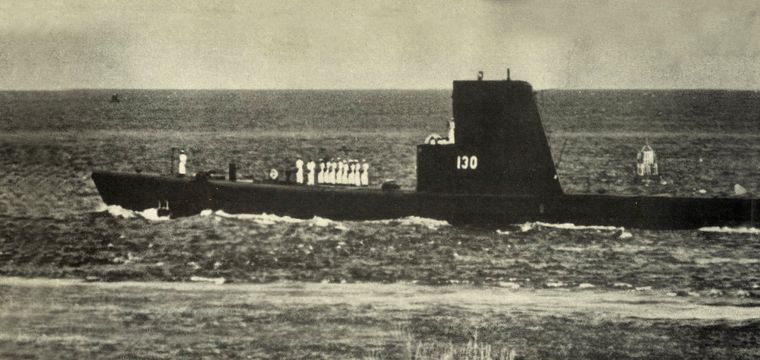
India’s aircraft carrier INS Vikrant, which played a major role in the war
Till 1971, the Indian Navy had been viewed as no more than a coastal fleet. Despite fervent pleas by Vice Admiral B.S. Soman, the fleet had been denied permission to venture out more than 200 nautical miles from the coast during the 1965 war.
Admiral S.M. Nanda, who succeeded Soman and Admiral A.K. Chatterjee as the Navy chief, was determined to change that image of the Navy. So much so, as chief of the Bombay-based Western Command and being tipped to be the next chief, he even boasted once to a newspaper that given a chance he would set fire to Karachi port, which he knew like the back of his palm. He was risking his chances for promotion.
As the 1971 war approached, Nanda, now the chief, was dismayed to see the preparations progressing with little role for the Navy. The logic was: the fleet has to stay put for guarding the ports.
Lost cause: Pakistani submarine Ghazi, which was sunk off, approaching Visakhapatnam
Nanda told this writer about it once. “I had a counter-logic. ‘What would the Pak Navy be doing?’ I was told, they would be guarding Karachi. If the enemy is guarding his base, why are you worried about Bombay? ‘Let’s go out and hit them’, I told them.”
The logic impressed not only Nanda’s flag officers but also prime minister Indira Gandhi. Nanda was confident the Navy could pull it off. During his 20 months as chief before the war, he had persuaded the government to get small but high-speed missile boats and got several of his officers trained in Russia. The enemy, who would have been alerted if he had gone for big warships, thought very little of the boats which no admiral anywhere had employed, or would employ for anything more than coastal skirmishes.
A day before the war opened, Nanda moved the entire fleet out of Bombay. Pakistani submarines waiting off Bombay went away empty-handed, while Nanda’s boats were revving up along the Saurashtra coast. On the night of December 4, three boats, escorted by two frigates, raced towards Karachi and fired missiles sinking PNS Khaibar, that had bombed Dwarka port in the 1965 war, and three more. One boat raced closer to the port, and missile-struck oil tanks and ammunition ships. Four nights later, the incredible happened. Another missile boat, under frigate escort, raced in again and hit an oil tanker, an entire oil farm and several ships. With that, the bulk of the Pakistan navy was destroyed or crippled, with no fuel for a few surviving ships to even sail out to safety. The Pakistan air force made a feeble attempt to chase the Indian boats but ended up destroying one of their warships in the confusion.
It is said, the Russian naval chief, Admiral Sergey Gorshkov who was getting satellite images of the battle, shouted out in joy and helped himself to a lot more vodka than his usual gallons.
Military historians say this was the only occasion in naval history wherein a port was attacked twice in one week.



